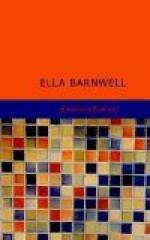Such, reader, as our description has set forth, was the general appearance of Younker’s dwelling, both without and within, in the year of our Lord 1781; and, moreover, a fair representative of an hundred others of the period in question—so arbitrary was necessity in making one imitate the other. But to resume our story.
In the after part of a day as mild and beautiful as the one on which we opened our narrative, but some four weeks later, Ella Barnwell, needle-work in hand, was seated near the open door leading from the apartment first described to the reader. Her head was bent forward, and her eyes were apparently fixed upon her occupation with great intentness—though a close observer might have detected furtive glances occasionally thrown upon a young man, with a pale and somewhat agitated countenance, who was pacing to and fro on the ground without. With the exception of these two, no person was within sight—though the rattling of a loom in the other apartment or cabin, betokened the vicinity of the industrious hostess.
For some moments the young man—a no less personage than our hero—paced back and forth like one whose mind is harrowed by some disagreeable thought: then suddenly halting in front of the doorway, and in a voice which, though not intended to be so, was slightly tremulous, he addressed himself to the young lady, in words denoting a previous conversation.
“Then I must have said some strange things, Ella—I beg pardon—Miss Barnwell.”
“Have I not requested you, Mr. Reynolds, on more than one occasion, to call me Ella, instead of using the formality which rather belongs to strangers in fashionable society than to those dwelling beneath the same roof, in the wilds of Kentucky?” responded the person addressed, in a tone of pique, while she raised her head and let her soft, dark eyes rest reproachfully on the other.
“Well, well, Ella,” rejoined Reynolds, “I crave pardon for my heedlessness; and promise you, on that score at least, no more cause for offence in future.”
“Offence!” said Ella, quickly, catching at the word: “O, no—no—not offence, Mr. Reynolds! I should be sorry to take offence at what was meant in all kindness, and with true respect; but somehow I—that is—perhaps it may not appear so to others—but I—to me it appears studied—and—and—cold;” and as she concluded, in a hesitating manner, she quickly bent her head forward, while her cheek crimsoned at the thought, that she might perhaps have ventured too far, and laid herself liable to misconstruction.
“And yet, Ella,” returned Reynolds, somewhat playfully, “you resemble many others I have known, in preaching what you do not practice. You request me to lay aside all formality, and address you by your name only; while you, in that very request, apply to me the title you consider as studied, formal and cold.”
“You have reference to my saying Mr. Reynolds, I presume,” answered Ella; “but I see no analogy between the two; as in addressing you thus, I do but what, under the circumstances, is proper; and what, doubtless, habit has rendered familiar to your ear; while, on the other hand, no one ever thinks of calling me any thing but Ella, or at the most, Ella Barnwell—and hence all superfluities grate harshly.”




